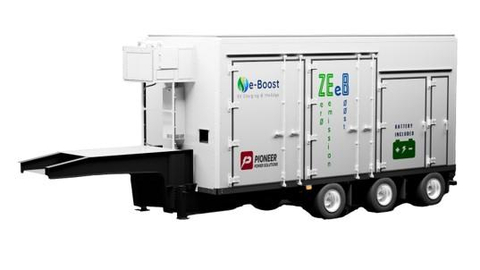Pioneer Power Partners with NOMAD Transportable Power Systems to Launch New Zero-Emission, Mobile EV Charging Platform and Re-charging Solutions
New e-Boost Platforms deliver Net Zero EV charging where it is needed, when it is needed; allowing charging for EVs off-grid (or during grid outages)

ZEeB: Zero-Emission EV Charging Platform (Photo: Business Wire)
Developed in partnership with NOMAD Transportable Power Solutions, Inc. (NOMAD), the leading domestic manufacturer of zero-emission, utility-scale mobile energy storage, Pioneer’s Zero Emission e-Boost (“ZEeB”) and EXZELCR platforms set a new bar in meeting the growing demand for low-carbon, mobile, e-Boost solutions with grid-gap solutions.
Under development with NOMAD since last year, the companies collaborated to design and test the platforms’ architecture. Like all of Pioneer’s e-Boost platforms, ZEeB and EXZELCR are mobile, but the new platforms offer the added benefit of battery energy storage to provide zero-emission EV charging. The new solutions will allow EV charging for a wide range of markets including at events, in remote locations, for disaster response, or even for fleet management where charging flexibility for a large number of EVs is a priority.
Pioneer eMobility is now offering the ZEeB to customers and is ready to begin delivery. The initial ZEeB has a 500 kW power capacity unit powered by KORE Power lithium-ion battery cells with 1.3 MWh energy storage capacity that can deliver more than five hours of EV charging with a 240 kW charger, more than 10 hours with a 120 kW charger or more than 21 hours with a 60 kW charger.
Later this year, the Company plans to introduce two larger ZEeB units offering 750 kW and 1 MW of capacity. The ZEeB is EV charger brand agnostic.
Pioneer’s new EXZELCR is available to allow for immediate, mobile, emissions-free, off-grid recharging of the ZEeB, while also offering additional value. EXZELCR includes onboard availability for 3-phase, 2-phase, and single-phase power availability making it a complete Disaster Recovery (“DR”) tool.
With ZEeB and EXZELCR, the Company has created a hybrid EV charging system that provides zero emission EV charging wherever and whenever it is needed, and it can be easily recharged within hours by EXZELCR for continuous availability.
“While many battery energy storage solutions are available in the US market, they are severely limited by dependence on a high-power, near-site grid connection for recharging,” said Nathan Mazurek, CEO of Pioneer. “By pairing a mobile battery energy storage solution with a mobile, low-carbon recharge system, we are opening immense possibilities for our customers. Whenever electricity becomes unavailable at a site, these units transform instantly into integral parts of a microgrid (“MG”) or Distributed Energy Resource (“DER”), which we believe places them years ahead of their competition when it comes to peak demand shaving and resiliency.”
Key features and benefits of the ZEeB and EXZELCR include:
● Fast, EV Charging, Anytime, Anywhere: Powered by a high-performance, mobile battery system, at 500 kW, it delivers exceptionally high-speed EV charging in the most remote or grid congested areas, enabling businesses to transition to EVs.
● Compact Form Factor: The compact design of both units makes them easy to transport and mobilize, simplifying EV charging for fleets, transit agencies, school bus depots, municipalities and sustainability events.
● Enhanced Future Resiliency: When grid connectivity comes to the client site, the ZEeB can be easily integrated with a grid connection into Pioneer’s E-Bloc solution, which offers complete microgrid connectivity options and enables a comprehensive Distributed Energy Resource that can integrate rooftop or canopy solar and other renewable sources into the facility. ZEeb is designed to double as a disaster recovery unit that can provide raw 480V, 3-phase, 240V or 120V power for any site use in times or urgent needs.
“NOMAD is committed to delivering mobile energy storage solutions that fill the gaps in providing safe, clean, reliable power,” said NOMAD CEO Paul Coombs. “Through our partnership with Pioneer, we’re allowing fast EV charging to be deployed as needed, while eliminating the restrictions of stationary charging stations, all with units made in the US.”
The Company believes that the launch of ZEeB and EXZELCR brings unrivaled EV charging flexibility, representing a significant step forward for EV deployment.
“The path to Net Zero will be a story of innovation and optimization, and with ZEeB and EXZELCR, our customers have a faster way to reach their EV charging and sustainability goals,” commented Geo Murickan, head of Pioneer eMobility.
In addition to fleets in
“Our customers are ready to embrace the EV transition, and with the decentralized design offered by ZEeB and EXZELCR, these solutions will streamline EV adoption,” Coombs added.
About Pioneer Power Solutions, Inc.
Pioneer Power Solutions, Inc. is a leader in the design, manufacture, integration, refurbishment, service and distribution of electric power systems, distributed energy resources, power generation equipment and mobile electric charging solutions for applications in the utility, industrial and commercial markets. To learn more about Pioneer, please visit its website at www.pioneerpowersolutions.com.
About NOMAD Transportable Power Systems, Inc.
NOMAD Transportable Power Systems, Inc. (“NOMAD”), is a
Forward-Looking Statements:
This press release contains “forward-looking statements” within the meaning of the federal securities laws. Such statements may be preceded by the words “intends,” “may,” “will,” “plans,” “expects,” “anticipates,” “projects,” “predicts,” “estimates,” “aims,” “believes,” “hopes,” “potential” or similar words. Forward-looking statements are not guarantees of future performance, are based on certain assumptions and are subject to various known and unknown risks and uncertainties, many of which are beyond the Company’s control, and cannot be predicted or quantified and consequently, actual results may differ materially from those expressed or implied by such forward-looking statements. Such risks and uncertainties include, without limitation, risks and uncertainties associated with (i) the Company’s ability to successfully increase its revenue and profit in the future, (ii) general economic conditions and their effect on demand for electrical equipment, (iii) the effects of fluctuations in the Company’s operating results, (iv) the fact that many of the Company’s competitors are better established and have significantly greater resources than the Company, (v) the Company’s dependence on two customers for a large portion of its business, (vi) the potential loss or departure of key personnel, (vii) unanticipated increases in raw material prices or disruptions in supply, (viii) the Company’s ability to realize revenue reported in the Company’s backlog, (ix) future labor disputes, (x) changes in government regulations, (xi) the liquidity and trading volume of the Company’s common stock, (xii) an outbreak of disease, epidemic or pandemic, such as the global coronavirus pandemic, or fear of such an event, and (xiii) risks associated with litigation and claims, which could impact our financial results and condition.
More detailed information about the Company and the risk factors that may affect the realization of forward-looking statements is set forth in the Company’s filings with the
View source version on businesswire.com: https://www.businesswire.com/news/home/20240123098373/en/
Brett Maas, Managing Partner
Hayden IR
(646) 536-7331
brett@haydenir.com
NOMAD Transportable Power Systems
Aleysha Newton
VP of Marketing
(208) 758-9391
anewton@nomadpower.com
Source: Pioneer Power Solutions, Inc.







